

Mindset-training - unique-talentbegeleiding. Top 5 reasons to celebrate mistakes at work. Zappos’ CEO Tony Hsieh recently tweeted this: “$1.6 million mistake on sister site @6pm.com.
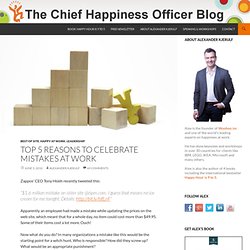
I guess that means no ice cream for me tonight. Details: Apparently an employee had made a mistake while updating the prices on the web site, which meant that for a whole day, no item could cost more than $49.95. Some of their items cost a lot more. Now what do you do? But this is not how they do business at Zappos. To those of you asking if anybody was fired, the answer is no, nobody was fired – this was a learning experience for all of us. This is not soft or wishy-washy, it’is a great way to handle mistakes in a business. Yes, that’s right, I said celebrate our mistakes. 1: When you celebrate mistakes, you learn more from the mistakes you make In one company, the CEO was told by a trembling employee, that the company website was down. When we can openly admit to screwing up without fear of reprisals, we’re more likely to fess up and learn from our mistakes.
How To Grow Your Business Mindset. How Rewards Can Backfire and Reduce Motivation. Surely one of the best ways to generate motivation in ourselves and others is by dangling rewards?
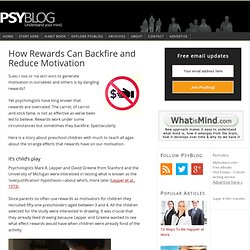
Yet psychologists have long known that rewards are overrated. The carrot, of carrot-and-stick fame, is not as effective as we’ve been led to believe. Rewards work under some circumstances but sometimes they backfire. Spectacularly. Here is a story about preschool children with much to teach all ages about the strange effects that rewards have on our motivation. It’s child’s play Psychologists Mark R. Since parents so often use rewards as motivators for children they recruited fifty-one preschoolers aged between 3 and 4. Hetkind. Hartger Wassink stuitte gisteren twee keer op het woord ‘bemoedigen’, toch geen term die hij dagelijks gebruikt.
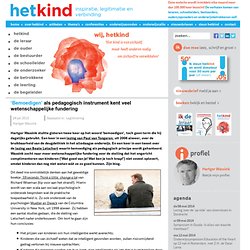
Een keer in een lezing van Paul van Tongeren, uit 2006 alweer, over de bruikbaarheid van de deugdethiek in het alledaagse onderwijs. En een keer in een tweet over de lezing van Beate Letschert waarin bemoediging als pedagogisch principe wordt gehanteerd. 5 Professional Dynamics That Shape Us… #3: MINDSET. Popular Today in Business: All Popular Articles Strategy By Bob Davis-Mayo, Published July 13, 2013.
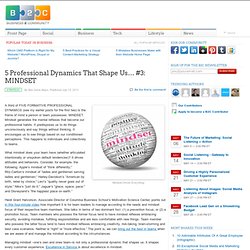
Person versus process praise and criticism. Praise for intelligence can undermine children's motivation. Can-learning-about-mindsets-improve-pupil-confidence. Self Theories. Growth mindset and fixed mindset How self beliefs affect motivation and thus achievement.
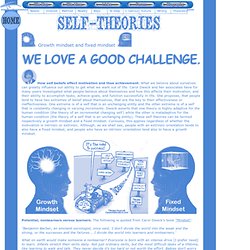
What we believe about ourselves can greatly influence our ability to get what we want out of life. Carol Dweck and her associates have for many years investigated what people believe about themselves and how this affects their motivation, and their ability to accomplish tasks, achieve goals, and function successfully in life. She proposes, that people tend to have two extremes of belief about themselves, that are the key to their effectiveness or ineffectiveness. One extreme is of a self that is an unchanging entity and the other extreme is of a self that is constantly changing in varying increments.
Potential, nonlearners versus learners. "Benjamin Barber, an eminent sociologist, once said, 'I don't divide the world into the weak and the strong, or the successes and the failures... What on earth would make someone a nonlearner? Growth Mindset versus fixed mindset - unique-talentbegeleiding. Developing_growth_mindset. 2013 Ridley Lecture: Carol Dweck on Student Mindsets » Videos » Curry School of Education. 2012-winter-spring-7. CarolDweckWorkshop. Carol Dweck, "The Growth Mindset: Non-Cognitive Skills & Learning" Fixed Mindset vs. Growth Mindset: Which One Are You? Here is an excerpt from an article about Carol Dweck, a professor of psychology at Stanford University: Through more than three decades of systematic research, [Carol Dweck] has been figuring out answers to why some people achieve their potential while equally talented others don’t—why some become Muhammad Ali and others Mike Tyson.
The key, she found, isn’t ability; it’s whether you look at ability as something inherent that needs to be demonstrated or as something that can be developed. To anyone who is into personal growth and self-improvement, this seems obvious. But clearly, it is not obvious to everybody: look at this diagram by Nigel Holmes representing the two types of mindsets and I’ll sure you’ll recognize the attitudes of many people you know.
Wat is jouw mindset? « GdB conflict & agressie management. Misschien heb je vroeger op de lagere school een test of een rapport gehad, waardoor je de overtuiging kreeg dat je slim of juist minder slim was.
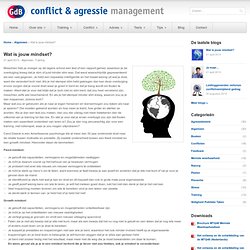
Dat werd waarschijnlijk gepresenteerd als een vast gegeven. Je hebt een bepaalde intelligentie en het maakt weinig uit wat je doet, want die verandert toch niet. Success Mindset. BreinWijs. Some examples of growth feedback: Forward in Solution-Focused Change: Developing a Growth Mindset - How individuals and organizations benefit from it. © 2011, Coert Visser Does success or failure depend on whether you do or don’t happen to have some or other fixed talent?
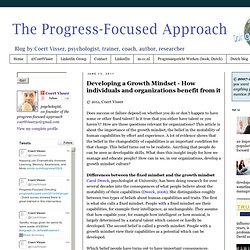
Is it true that you either have talent or you haven’t? 15 Benefits of the Growth Mindset. Followup to: Why Your Mindset is So Important Want to have more fun in life?
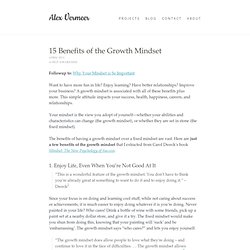
Carol Dweck, Growth Mindsets and Motivation. Test je mindset - intelligentietest - Psychologie Magazine. Mindset Matters. Mindset is about believing in yourself.

Carol Dweck, the Lewis and Virginia Eaton Professor of Psychology and author of "Mindset" discovered in her research at Stanford that belief guides a large part of your life. Much of what you think of as your personality actually grows out of this "mindset" and could prevent you from fulfilling your potential. You can have either a fixed mindset or a growth mindset. Think about someone you know who has a fixed mindset. Consider how they are always trying to prove themselves and how they are supersensitive about being wrong or making mistakes. Mindset als invloedsfactor. Mindset: het verschil tussen stoppen of doorgaan. Eight Ways of Looking at Intelligence. Big Ideas In “Thirteen Ways of Looking At A Blackbird,” poet Wallace Stevens takes something familiar—an ordinary black bird—and by looking at it from many different perspectives, makes us think about it in new ways.

With apologies to Stevens, we’re going to take the same premise, but change the subject by considering eight ways of looking at intelligence—eight perspectives provided by the science of learning. A few words about that term: The science of learning is a relatively new discipline born of an agglomeration of fields: cognitive science, psychology, philosophy, neuroscience. Its project is to apply the methods of science to human endeavors—teaching and learning—that have for centuries been mostly treated as an art.
As with anything to do with our idiosyncratic and unpredictable species, there is still a lot of art involved in teaching and learning. 1. Situations can be internal or external. On one level this is obvious, but on another it is quite radical. 2. 3. 4. 5. 6. 7. 8. Doorzettingsreacties en hulpeloze reacties (Dweck) Mindset - hoe bepaalde complimenten averechts kunnen werken. Feedback gericht op growth mindset - Goesting in Leren en Werken. Het ontwikkelen van een groeimindset - Hoe individuen en organisaties ervan profiteren. © 2011, Coert Visser.
Stencil mindset. Check je eigen mindset. Effectief leren complimenteren. © 2008, Coert Visser 1. Voorstanders en skeptici van complimenteren Complimenteren is voor velen aantrekkelijk. De meeste mensen vinden het prettiger en zien het als opbouwender om iets positiefs te zeggen dan om iets negatiefs te zeggen.